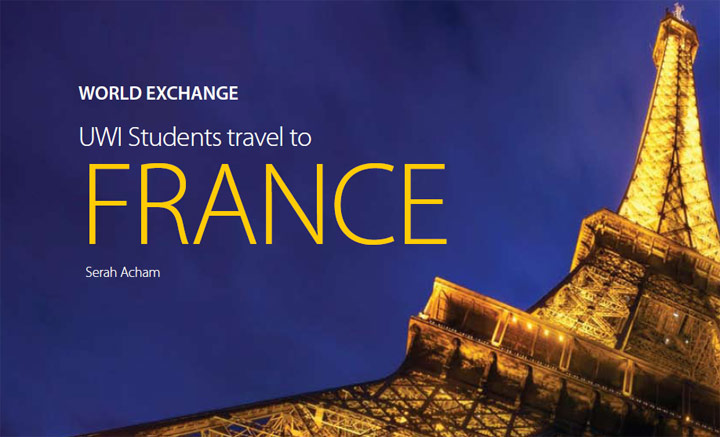
UWI students are travelling all over the world thanks to a multitude of study abroad and scholarship opportunities offered through The University’s International Office. With agreements with more than 50 universities in the United States, Europe, South and Central America, Asia, Africa and within the Caribbean, students and staff can study art history at the Louvre in Paris, become a dental resident in New York, investigate agricultural best practice in China, or learn computer programming in Kenya.
Students of the French programme, at the Department of Modern Languages and Linguistics (MLL), can enhance their language skills by living and studying or teaching in a French-speaking country for up to one year. MOUs have been signed between UWI and Université des Antilles-Guyane in Martinique, the University of Montreal in Canada, Université Michel de Montaigne - Bordeaux 3 in France, and another is in the works with Université Paris Sorbonne - Paris IV, also in France.
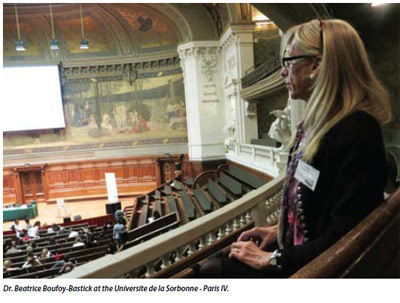 Undergraduate students in the second year of their French Majors, as well as Postgraduates reading for their MPhil or PhD degrees in French are eligible for each of the study abroad opportunities, as long as they’ve demonstrated a certain level of fluency in the language. Students who participate in the student exchange programme at Bordeaux spend from one semester to a full academic year at the university, where, as full-time students, they take courses which count towards their final degrees. “We are quite selective about who goes to France”, says Dr. Boufoy- Bastick. “They need to have reached a specific level of proficiency to do the Bordeaux exchange because it’s really a big step. It’s a whole year where they’re fighting by themselves in a new education system, in a new context.” Undergraduate students in the second year of their French Majors, as well as Postgraduates reading for their MPhil or PhD degrees in French are eligible for each of the study abroad opportunities, as long as they’ve demonstrated a certain level of fluency in the language. Students who participate in the student exchange programme at Bordeaux spend from one semester to a full academic year at the university, where, as full-time students, they take courses which count towards their final degrees. “We are quite selective about who goes to France”, says Dr. Boufoy- Bastick. “They need to have reached a specific level of proficiency to do the Bordeaux exchange because it’s really a big step. It’s a whole year where they’re fighting by themselves in a new education system, in a new context.”
Stringent though it may be, this policy has paid off. “Our standard for our students who are going to France is significantly higher in language proficiency than their students from Bordeaux. It’s not to congratulate ourselves at UWI but our students are doing extremely well if not better internationally”, she continues.
Eric Maitrejean, Lecturer in French at The UWI, adds that the student exchange programme with Université Michel de Montaigne - Bordeaux 3 “has proven a resounding success”. He explains that, since the MOU was signed in the late 1990s, “we welcome undergraduate and postgraduate students from Bordeaux on a regular basis – albeit in small numbers”, and in return, each year Bordeaux accepts an average of three UWI students who typically stay for the entire academic year. “Our students are so appreciated that Bordeaux 3 has without interruption hired past UWI students as visiting lecturers in their English department for the past 10 years … They even started a (postgraduate) programme on International Politics mounted in collaboration with Haiti, UWI and Bordeaux.”
Four students who visited France as part of the student exchange programme with Bordeaux 3 describe their experiences.
 3rd year French and Spanish double major 3rd year French and Spanish double major
Visited Bordeaux in academic year 2011-2012
Spent 1 academic year in France
What was your living situation at Bordeaux?
We (including the other two UWI students he went with) lived offcampus in student housing (which) is actually difficult to get ... but because we were sent up with an exchange programme we were able to reserve those rooms ... they were very, very, very tiny ... but very comfortable because only one person is meant to live there.
What were the courses at Bordeaux like, as compared to UWI’s?
With regards to the Spanish, it wasn’t the same. I actually am going to say that those of us that did Spanish at Bordeaux are at a bit of a disadvantage now, in year three, because UWI has a very comprehensive programme. They try to cover all the bases and it’s very challenging, especially for year two, so it’s a bit of a jolt coming back into year three and not having had that foundation in year two Spanish.
What was your favourite part or your experience?
I loved the independence, because I had never lived on my own before. I loved being able to make my own decisions ... You had to take care of everything ... There’s no one to help you do your laundry, no one to help you wash dishes and no one is designating tasks to you ... you have to do it because if you don’t, things would pile up ... in a couple years I would be living on my own and be fully independent, so it was a taste of what that would be like. Another thing I really loved was the reliability of the public transportation system. I loved being able to check online and know that a train or a tram or a bus is coming at whatever time. They have the oddest of times, like 6:07 and you know that at 6:07 the bus would come. It’s not like that here and I think that Trinidad has a long way to go with regards to having a reliable public transportation system.
I loved the general sense of safety. I would walk in the dark at late hours and I would have my iPod and I would have my phone and I wouldn’t be concerned that someone would rob me ... of course, you’re not going to walk in every dark alley because it’s France, not paradise ... (but) if you would go to a show or out liming, you had to get home and it was after midnight, it was not uncommon to walk the streets at that time and feel safe and see other people doing it and feel safe.
I also liked the fact that France is a large country and there’s a lot of it that I still haven’t seen. Apart from being in Bordeaux, I visited Paris twice, I went to Leon and I went to Toulouse. Because it’s such a large country and there’s so much variety within the boundaries of the country itself, you’d find a different culture in Toulouse, a different culture somewhere else ... for anywhere between €30-something to €50- something, you can jump on a train and get to another city. It’s nice because ... you get to see another French city and it’s different and travel is affordable.
What did you find most challenging?
Self control with regards to getting things done and finances ... I have ADHD (Attention Deficit Hyperactivity Disorder) and for the first time in my life there was no support system to say “okay Tevin it’s time to do this now”. ... There were certain days I felt things were spinning a little bit out of control, but I got it back together ... Skype and cell calls can only do so much ... You find yourself playing so many roles that other people have played for you and the change was so sudden, because one minute you’re home and literally a day later, after all the hours of travelling, you find yourself having to do it as an independent person. It was a bit of a shock I would say.
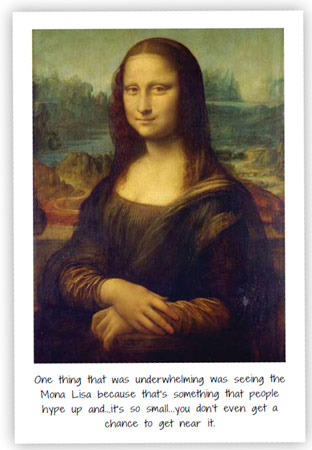 What was your most memorable experience? What was your most memorable experience?
Being in Paris ... it’s one of those idyllic things ... you get to do things that seem like a big deal but then you look back and you say to yourself, “I did it” ... literally two days after I had got back the Tour de France was going on and they showed it on television and I think that a year ago, had I watched that, I would say “oh wow they’re riding through the streets of Paris and look there’s the Arc de Triomphe and there’s the Eiffel Tower,” ... (but) it was like “about two weeks ago, I was here!” You identify with it. It’s one of those landmark things ... and I did it ... you actually shock yourself.
One thing that was underwhelming was seeing the Mona Lisa because that’s something that people hype up and ... it’s so small ... you don’t even get a chance to get near it. I had to push and shove to get a picture. (He points to the cover of the T&T telephone directory that’s nearby) They had cordoned off a whole area for that and there are hordes of people trying to see this historic thing and you can’t even see it properly.
How did you spend your free time?
I think the most intimate moments I had were with Trinis, which is both good and bad, but I think that connection that you’d have with a Trinidadian is unsurpassed ... There was a guy that was spending some time in Bordeaux, I think he lived in Ireland, but he was a Trinidadian and he came up to us very randomly and said “are you guys from Trinidad?” and it’s a pleasant surprise. People don’t greet each other with that much joy in Trinidad, but outside, because you’re in the minority, you leap towards that connection. It’s not just Trinidadian, it’s Caribbean. I think there’s something that ties Caribbean people together.
Any advice for students thinking of studying abroad?
Go. There are only three spots for the Bordeaux programme but what a lot of people do is apply to do the assistantship which can be done at the end of the degree or at the end of your second year ... Even if it’s not French, I encourage people to go. There were girls who did French with us and they went to Montreal ... I think that the thing is just to leave ... it broadens your horizons ... I would say go and speak to Marcia McDonald Howard in the International Office. She’s extremely helpful and she got us through the whole process. You have to make sure that you get your courses approved. Make sure that your GPA is at a certain level.
What did you get out of it?
I think that I’m a lot more open minded ... I’m a lot more comfortable with myself because I know I was able to exist outside what I’ve always known.
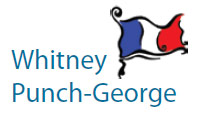 3rd year French and Spanish double major 3rd year French and Spanish double major
Visited Bordeaux in academic year 2011-2012
Spent 1 academic year in France
How did you enjoy your experience in France?
At first, I was a bit scared because it was my first time on my own and I was so far away from home. Then the other students came up and the excitement to face our new adventures began. The majority of that experience was really like a dream because even now, I would watch movies and say “Wow! I was there!” But obviously, at times like Christmas I missed my family and coming down to the end, even though I was travelling, I was getting a little homesick.
What was your living situation at Bordeaux?
I lived on Campus ... I had four floor mates with whom I shared a kitchen. Jessica Bion, a French girl; Mathis, a French guy who stayed with me for the entire year. There was Alice, and Sebastien, a French guy who was there for the first semester; and they were replaced by Cyril, a Turkish man; and Lamine who was from Senegal. It was interesting to encounter so many different styles of cooking in a day and to taste the food as well.
How did you spend your free time?
I spent my free time exploring Bordeaux with a few of the other Trinidadians, meeting up with friends I made there from Canada, Russia and France, watching football and of course visiting other cities in Europe.
What was your favourite part of the entire programme?
That I was able to make so many friends from so many parts of the world who I educated about my country.
What did you find most challenging?
To be honest, the most challenging aspect was having to cook for myself every day. It was so hard to resist the temptation to go buy food and what made it worse was that everything to eat was so far away.
What was your most memorable experience from your time in France?
I don’t have one, I have several. I will just mention my favourite three. First of all, when I went to the Eiffel Tower, the symbol of France, that kind of confirmed for me that I was actually in France. Then going up to the top and seeing the Trinidadian flag with the distance from the Eiffel Tower was just overwhelming.
(Second), when I went to the Camp Nou Stadium in Barcelona – this football stadium is like Mecca to my family, somewhere we all aspire to go and I was the first member to do so. Even though I did not see a match or the players, just being there was amazing.
(Third), I spent several weeks throughout the year with a French family in Carcassonne. This was incredible because each time I went my French improved in leaps and bounds ... they only spoke to me in French and spending time with the children who spoke no English was another way I had to learn to express myself.
What did you gain from studying abroad?
Even though we do have a problem of co-existing in Trinidad, at least we really embrace our cultures. I encountered people, children and adults who wanted to touch my hair because they had never seen anything like it.
Secondly I, have a new desire to travel more and learn about these different cultures with which I co-habited. I want to visit my Russian and Turkish and African friends. I do believe that I am now more independent of my parents. I have also learned how to manage my money, which is really good because I used to spend blindly ... it has enriched me in so many ways.
What advice do you have for other students interested studying abroad?
Whenever an opportunity such as this one is available and you have the means and are capable to take (it) ... think of the Nike slogan “JUST DO IT”. There will be no regrets.
 3rd year French and Literatures in English double major 3rd year French and Literatures in English double major
Visited Bordeaux in academic year 2011-2012
Spent 1 academic year in France
What classes did you take?
I took courses in French language, such as translation, French literature and courses in British and American Literature as well.
What was your living situation?
I lived in a student room on campus. It was very easy to clean seeing as there was not much to clean – it was pretty small – but I did not have to share so there was some degree of privacy. I had my own bathroom but unfortunately there was no kitchen, shared or private, in the entire building. So my cooking for the entire year was done on a hotplate in my room. On the upside, my building was recently built so all the furnishings ... were brand new.
How did you spend your free time?
I did a lot of travelling. I took a trip almost every long weekend and semester break. There were also a lot of activities such as going on wine tours and visiting the opera house that I enjoyed a lot.
What was your favourite part of the entire programme?
With regard to my English literature courses, it was awakening to study works from a European point of view. In UWI, much stress is placed on colonialism and post-colonialism.
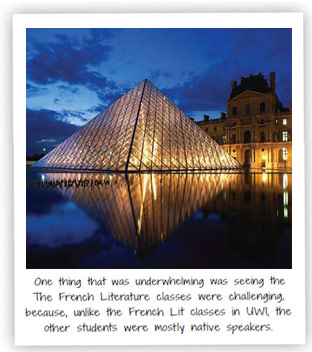 What did you find most challenging? What did you find most challenging?
The French Literature classes were challenging because, unlike the French Lit classes in UWI, the other students were mostly native speakers. Therefore, it took an extra effort on my part to try and keep up.
It was also a bit difficult adjusting to the cold in winter. It is very exciting in the beginning when you see snow and you are excited to put on those brand new winter boots. But after two months, it’s tiring to have to put on endless layers to walk to class in the dark at half past seven in the morning.
What was your most memorable experience?
It is very hard to choose and it may sound cliché, but my first trip to Paris was definitely quite memorable. In secondary school, I had often studied, seen pictures of or even created brochures for the most famous sites in Paris. It was so wonderful to see these majestic monuments unfold before my eyes and I was even filled with a sort of nostalgia for my French classes in secondary school.
What did you gain from studying abroad?
I think this experience helped me improve my confidence and proficiency in the French language and gave me a better insight into French culture. I also got the chance to become more independent since I was responsible for managing my budget, paying rent, cooking and laundry.
What advice do you have for other students interested studying abroad?
I thoroughly recommend the study abroad programme to other students. There is so much to learn and experience, not just with the lecture hall, but in the wider world. I think it is important to broaden your mind and expose yourself to other cultures and meet people from different backgrounds. It can really give you a new take on life.
 Recent UWI graduate with a BA in French and Spanish, with Honours Recent UWI graduate with a BA in French and Spanish, with Honours
Visited Bordeaux in academic year 2010-2011
Spent 1 academic year in France
during his time at UWI and is now a part of the English Teaching Assistantship programme, where he teaches English at a high school in Bordeaux
Why did you choose to go to Bordeaux?
Since my first encounter with French and Spanish, one of my most elusive goals had been to travel and possibly live in France or Spain. This being the case, I naturally jumped at the opportunity to realise one of my goals at such an early age.
How did you enjoy your experience in France?
While the mastering of two foreign languages did take its toll from time to time, I thoroughly enjoyed my time spent in French and Spanish classes in France. To be able to see languages taught and learnt in a completely unfamiliar setting was quite an eye opening experience and one which made me greater appreciate my own.
What was your living situation?
I lived on campus at a student residence known as Village 5 and had six roommates who came from China, Algeria, Tunisia and France. Our cultural and culinary differences often made for quite interesting conversation and for the most part allowed for a very enriching living situation. Learning about each other’s likes, dislikes and ways of life gave a newfound definition to the term ‘melting pot’ as we came together to form a very unique group of floor mates.
How did you spend your free time?
The little free time that I was afforded was spent visiting different cities within France, touring museums, attending occasional operas and learning about the country and city that I called home. Nevertheless, I also took the time to attend parties with friends and to go clubbing, European style.
What was your favourite part of the entire programme?
Undoubtedly, I treasured the opportunity to be completely immersed in such a rich and vibrant culture. The sights, the sounds, the smells, the people, the architecture and the way of life have all made indelible marks upon me and will forever remain close to my heart.
What did you find most challenging during your time abroad?
At the beginning, I found it somewhat challenging to express myself in French in an eloquent and articulate manner. Though, with much practice and determination, I was able to master the language and now speak French fluently. Likewise, being constantly immersed in French culture proved somewhat difficult where the upkeep of my Spanish language skills were concerned. However, being a two-hour train ride away from Spain worked to my utmost advantage as I grew close to many Spaniards during my stay.
What was your most memorable experience?
Although I studied in France, visiting Amsterdam was the most memorable experience of all. Taking the time to see and explore what such a city, that is more notably infamous than celebrated, has to offer taught me quite a lot about European history and the reasons for certain customs and traditions.
What did you gain from studying abroad?
This opportunity opened my eyes to even more than I could have possibly imagined and displayed the wealth of knowledge and experience that one can possibly acquire outside of our shores. Travelling has always been something that I enjoy doing and living among such a large number of Europeans and immigrants from other countries, I was able to travel without physically leaving the country. I have gained a greater sense of appreciation for certain things that I once took for ranted and have learnt to see things in a broader perspective.
What advice do you have for other students interested in studying abroad?
There is a difference between visiting a country and living in a country for an extended period of time, especially for those seeking to master a foreign language. Such a feat remains unattainable unless one has the opportunity to fully immerse themselves in the culture and way of life of the country that speaks the language. |